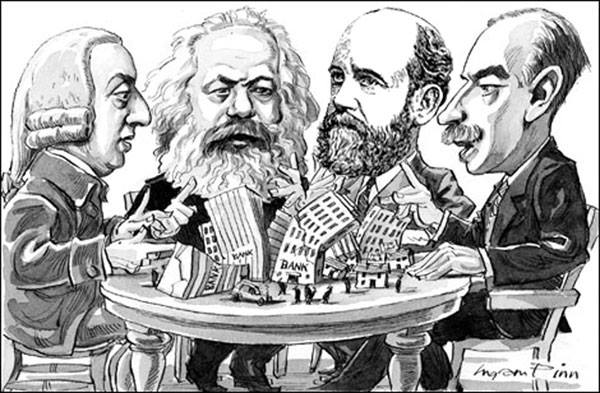1. Technological Determinism
Technological determinism is an idea that suggests that theway a society's technology improves, and changes is based on its own way ofworking effectively. This way of improving technology also affects how thesociety's social and cultural values and structures develop. In other words,technology has a big influence on how a society changes and grows over time. Technophobia(against technology) and Technophilia (for technology) are both forms oftechnological determinism.
According to Christian Fuchs (2014): “Technology is conditioned,not determined by society, and vice versa. This means that societal conditions,interests and conflicts influence which technologies will emerge, buttechnology’s effects are not predetermined because... [technologies are]unpredictable” (p. 203)
Society must adopt a critical theory of technology, one thatunderstands technology, its potential, and both the positive and negativeeffects it may have.
2. Critical Political Economy & Capitalism
Christian Fuchs (2014) says “The political economy ofcommunication is critical and therefore looks at who has power, in this case politicaland economic power.”
The critical political economy essentially criticizescapitalist ownership. It says that capitalism is not natural but is rather asocially determined and historically derived mode of production. Capitalism is theninherently exploitative; it dictates and structures our everyday lives. Capitalismis bad according to critical political economy because it results in dramaticpolarizations of poor and wealthy.
3. Social Media’s Political Economy
Social media operates within a capitalistic economy and arecreated for profit. Social media exploits its users for profit, just as anycapitalistic entity does. At the beginning of social media and big tech companies,Silicon Valley was the first place for them to grow. But over time, it became exploitative,racist, and widened the inequality gap. According to McChensey (2013), when newtechnologies are introduced, new hierarchies are formed and new monopolies.That speaks on the way capitalism works, the polarization of the wealthy and poordoesn’t just apply to monetary characteristics, but also power. Thesemonopolies lead to exploitation of smaller companies and domination because ofpower imbalance.
4. Privacy
Exploitation in the context of social media’s politicaleconomy is seen in the lack of privacy. Big tech companies are not transparentwith its users on how they use their data and who can see it. They use privacy breachesas a business model, selling data to advertisers. Profits drive this exploitationof privacy and privacy breaches.
5. Socializing Social Media
Another issue with capitalism and its effects on socialmedia, is that it could be socialized and used for good but is forced to be exploitativebecause of capitalism. Social media in its intended purpose has good intentions,but when it becomes profitable, they get thrown out the window. If social mediawas decentralized, gave users freedom, and granted users privacy, it would bemore people-friendly and accessible. Social media is used for struggle,activism, socialization, and more, but it is overshadowed by its negative effectsand negative position within society.
References
Dugan Nichols, L. (2023, February). WRI227: Social Media and Content Creation. Mississauga; University of Toronto Mississauga.
Fuchs, C. (2012). The Political Economy of Privacy on Facebook. Television & New Media, 13(2), 139–159. https://doi.org/10.1177/1527476411415699
McChesney, R. (2013). Digital disconnect: How capitalism is turning the Internet against democracy. New York: New Press. (pp. 130-159).


